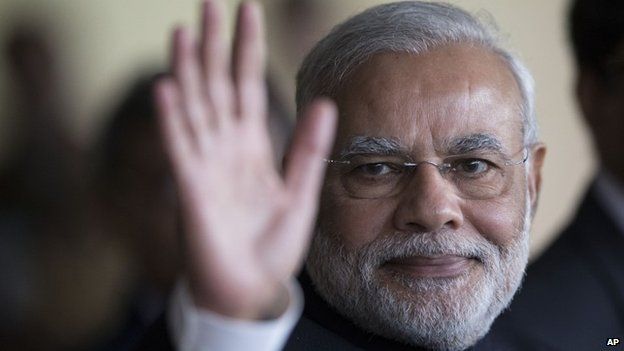Will Modi's Nepal visit mark a change in India's water policy?
- Published

Narendra Modi is the first Indian prime minister visiting Nepal in 17 years, although the two countries share an open border and claim to have a close relationship.
One of the most contentious issues between the two has been sharing and developing trans-boundary water resources.
Officials and experts say it will be high on the agenda during Mr Modi's official trip to the Nepalese capital, Kathmandu, his second visit abroad after Bhutan since he assumed office in May.
They believe the two-day visit beginning on Sunday could end the decades-long deadlock if a major deal is signed to the satisfaction of both sides.
But that is a really big if.
Controversies surrounding past treaties and deep-seated suspicions have held hostage mega-projects planned on Nepalese rivers that contribute up to 70% of water to India's Ganges during dry season.
Monopoly charge
In the latest reflection of mistrust, Nepalese politics remains heated following a controversy over a hydropower development agreement recently proposed by Delhi.
Nepali politicians from both ruling and opposition parties claimed that the proposal was aimed at securing India's monopoly over Nepal's water resources, an allegation India has dismissed.
Delhi also clarified that Kathmandu was free to amend and modify the proposed document.
"India-Nepal relations are constantly being upset by insensitivity and blundering on the part of India and hypersensitivity and proneness to misunderstanding on the part of Nepal," former Indian water resources secretary Ramaswami Iyer wrote in the Indian Express newspaper following the latest controversy.
"Because of that background, I had once cautioned against attempts to negotiate new treaties or agreements."
Mr Modi has promised improved relations with India's smaller neighbours and invited their heads of government to his inauguration.
To lay the groundwork for Mr Modi's visit, Indian Foreign Minister Sushma Swaraj last week went to Kathmandu and signed a communique that mentions at least half a dozen water and power projects.
Some politicians in Nepal are hopeful that India's new foreign policy towards its neighbours may also get reflected in bilateral hydro-resources development.
"They have indicated that they would not like to repeat the past mistakes," says Bhim Rawal, a member of a multi-party task force formed to advise the government on what should be agreed on water resources with India during Mr Modi's visit.
"Whether what they have signalled does happen actually or not remains to be seen."
Differing priorities
Mr Rawal's party, the Communist Party of Nepal (Unified Marxist Leninist), a major partner in the coalition government, split following controversies surrounding the Mahakali river treaty signed with India in 1997. It reunified years later.
The controversial treaty's major component is the Pancheswor project that plans to irrigate huge swathes of land and generate more than 6,400MW of hydropower to be shared by the two countries.
The project was intended to have been built within eight years, but even 17 years since its signing, a detailed project report is yet to be prepared.
"During Mr Modi's visit we expect the Pancheswor project to move ahead and construction of Arun III project [another major hydropower project long in the pipeline] may also be proposed," says Mr Rawal.
"But the agenda of building these projects with India's help should be totally separate from the agreement on selling hydroelectricity to India we may sign during the visit.
"Because the moment you mix the two things, it becomes controversial and creates apprehensions that Nepal may be losing its water in the name of letting India develop its hydropower, that was why India's recent proposal generated controversy and so we have asked our government to stay clear of that."
Officials said a new power trade proposal was being finalised ahead of Mr Modi's visit.
But experts believe the major challenge will be finding a balance between the two countries' priorities when it comes to tapping water resources.
Nepal badly needs hydropower generation for both internal consumption and electricity export earnings.
Despite its rich water resources, the country suffers from crippling power cuts because not even 1% of its hydro potential has been tapped.
Delhi, meanwhile, has other water-related priorities.
Indian officials have long said their main interests were flood control and irrigation, and if Nepal was able to give them any hydroelectricity, it would be a bonus.
India also has a major water shortage - a recent report by the Nature Conservancy shows that five of the 20 most water-stressed cities in the world are in India and the capital, Delhi, is second on the list.
Satellite images have shown that India's underground water tables have depleted to dangerously low levels.
Experts say given all this, India's main interest is securing water supply, unlike Nepal's hydropower ambitions.
They believe the different needs of the two countries mean there will have to be a give and take between them, something that has not happened all these years.
So, will that change now? All eyes are on Prime Minister Modi and his promise of new diplomacy.
- Published29 May 2014
- Published26 May 2014
- Published22 May 2014
- Published21 May 2014